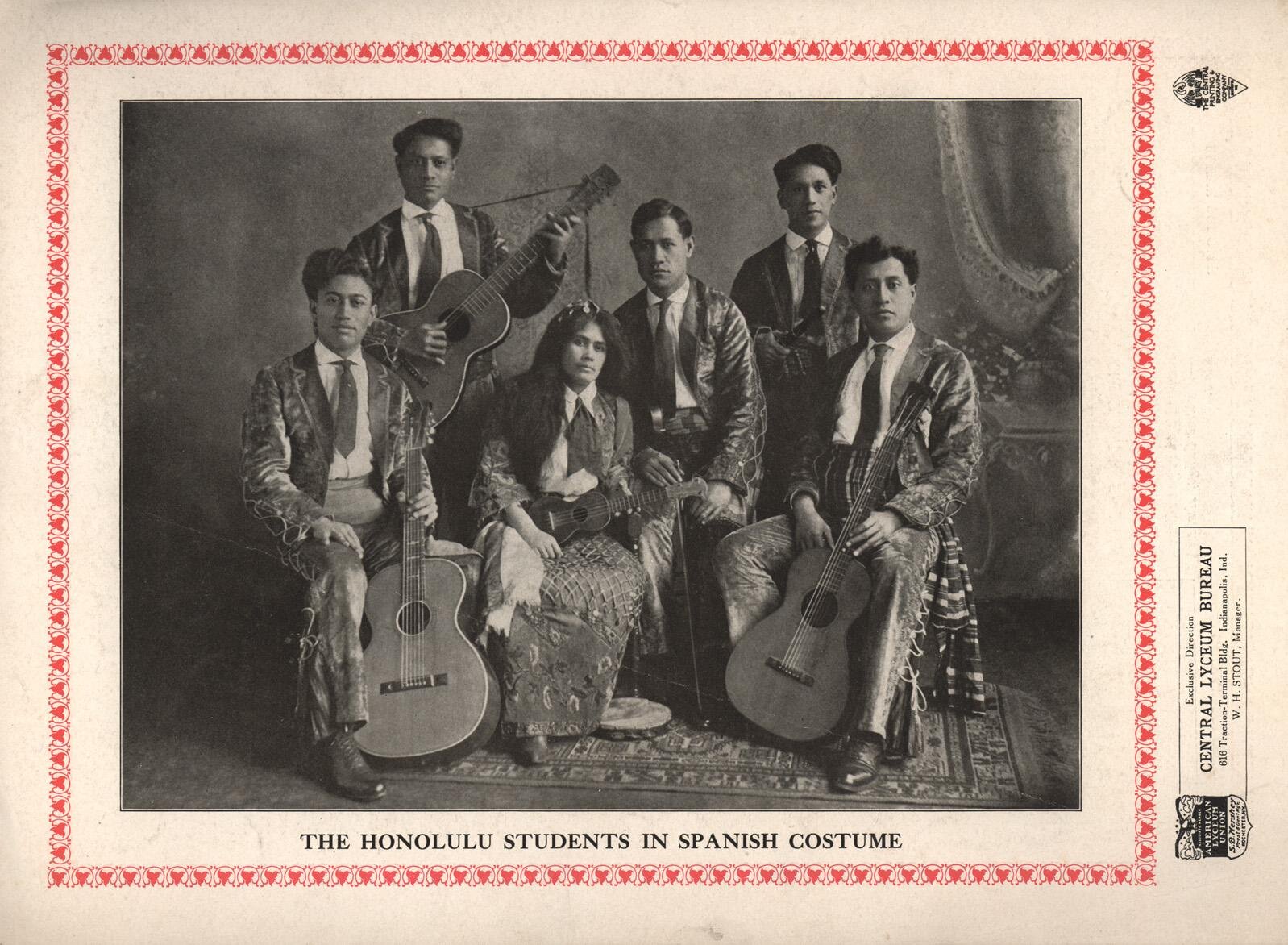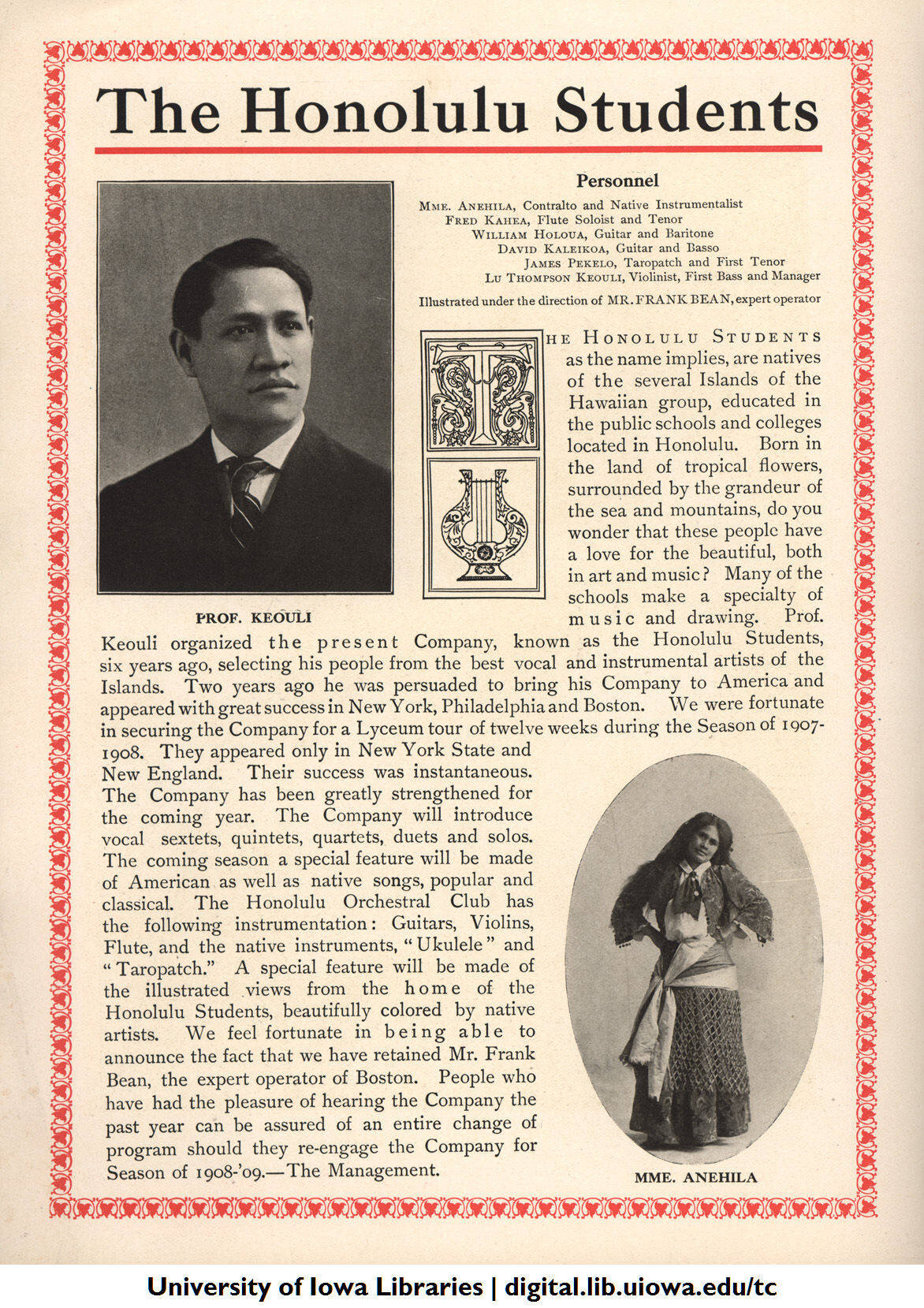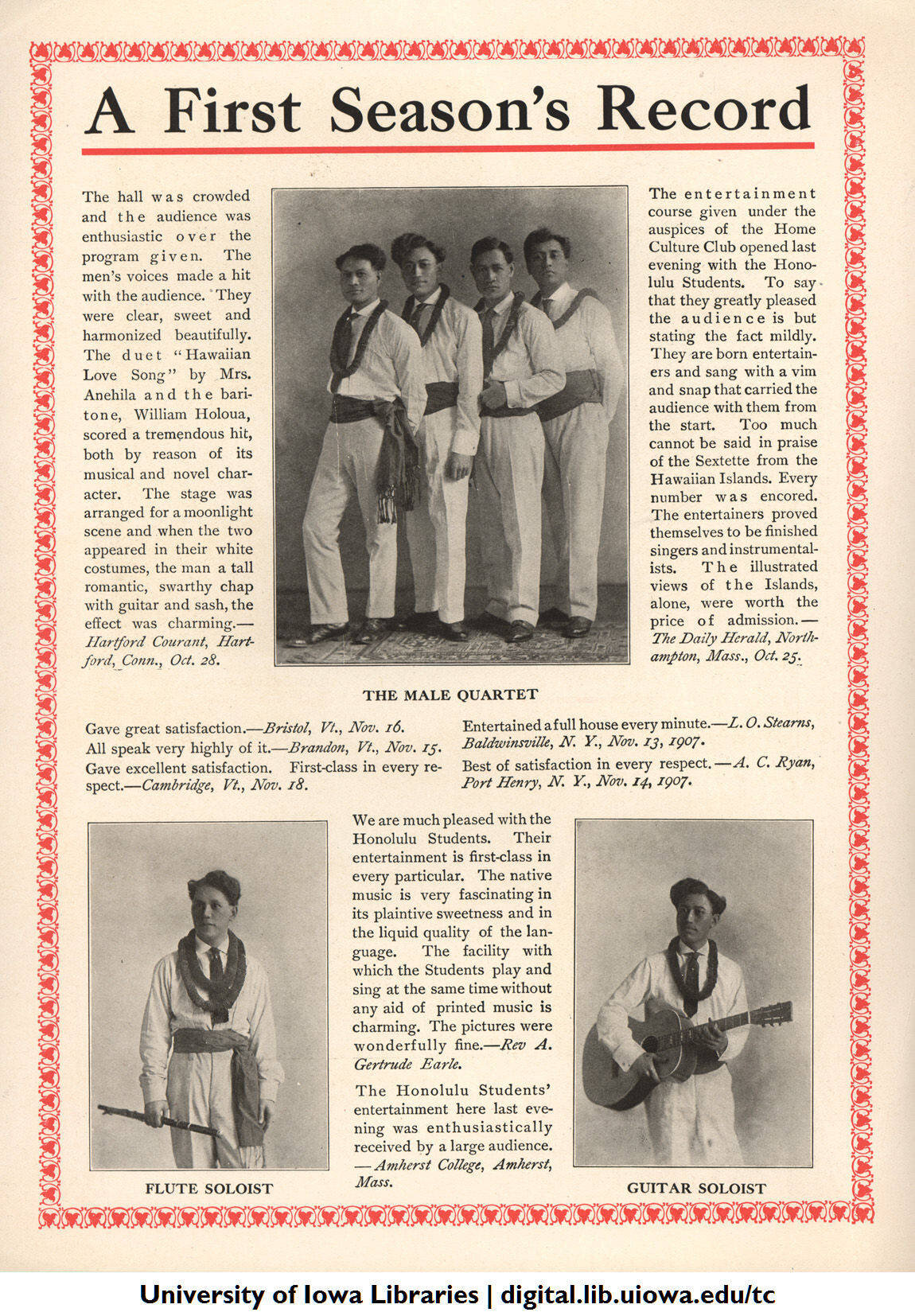Kealakai Center for Pacific Strings Fundraiser! April 5th 2019
TICKETS: http://bit.ly/sovereign-strings
I am thrilled to partner with Maile Myer, and the Puʻuhonua Society in presenting a concert of Sovereign Strings at the historic St. Andrews church, Friday April 5th! This event will be a fundraiser for the Kealakai Center for Pacific Strings, a non-profit I have founded to continue and expand the work researching and celebrating Hawaiʻiʻs legacy of excellence, innovation and influence in the world of music and luthiery.
This event will take a closer look into 19th century Honolulu and the incredible diversity of musical cultures that thrived in the kingdoms cosmopolitan capital port city of Honolulu. Tracing over a century of Hawaiʻiʻs music history through the journey of Mekia Kealakai, from his beginnings as star pupil of Prussian Kapellmeister Henry Berger at the Boys Reform School, to his international success as a music educator and virtuoso multi-instrumentalist, and finally to his return to Hawaiʻi in 1920 to lead the Royal Hawaiian Band.
Featuring a performance by the Sovereign String Band under the direction of Maestro Aaron Mahi, performing new arrangements in the old style with works by prince William Pitt Leleiōhoku and his Kawaihau Glee Club, Mekia Kealakai, David Nape, HRH Liliʻuokalani, Moʻi Kalākaua, Queen Emma, and more.
TICKETS: http://bit.ly/sovereign-strings
Sovereign String Band featuring:
Maestro Aaron Mahi- Ukulele Puka Asing- Banjo Ukulele Raiatea Helm Starr Kalahiki Blythe Kelsey Jeff Peterson- Guitar Ian OʻSullivan- Guitar & Ukulele Maikaʻi Nash- Piano Lance Suzuki- Flute Reggie Padilla- Saxophone Fumiko Wellington- Violin Rachel Saul- Violin Anna Callner- Cello Scotty Furushima- Hawaiian Steel Guitar Adam Asing- Double Bass
For those of you that were unable to attend the concerts in January, I invite you to join us for a night of food, music, community and history, in a sacred and historic space.
Papākolea style Hawaiian food by master chef Puka Asing!
A hui hou! -Kilin Reece
Royal Hawaiian Troubadors The Honolulu Students CD Released!
The recordings on this CD were made just after the turn o fthe 20th century, and have roots in an era before music had ever begun to be captured and recorded, a time when if you were not playing music yourself or listening to someone else play, you simply were not hearing music at all. They represent a time when a monumental shift in our relationship to sound was taking place, a shift that would change not only how we interact with music, but also how we relate to the people that bring music to life before us. The widespread capture and resale of sound that soon followed led directly to the birth of the musical genre- a system of classification made in the interest of marketing this newly harnessed commodity.
The extraordinary discovery of this music owes itself to an old-fashioned pilgrimage to the reading room at the American Folklife Center at the Library of Congress in Washington D.C., while researching the life of prolific Hawaiian composer and multi-instrumentalist Mekia Kealakai. A chance conversation with a gracious librarian revealed a collection of old records performed by a Hawaiian string band alternately calling itself the Royal Hawaiian Troubadors and the Honolulu Students. Born in 1882, bandleader of the Honolulu Students, Lui Thompson got his start playing in Mekia Kealakais Hawaiian orchestra on a tour across the U.S. in 1901.
Hawaiian musical ensembles began touring the continent long before there was such a thing as the “Continental United States”. For much of the 19th century, the port city of Honolulu was the largest and most cosmopolitan crossroads in the Pacific region, trading music and commercial goods extensively with the Mexican cities of Sacramento, San Francisco, Los Angeles, and Vera Cruz, as well as the Russian fur trading posts of the Alaskan territory.
At age 19, Lui Thompson performed with Kealakai playing violin at the 1901 Buffalo World’s Fair. He later recalled hearing President William McKinley’s last speech before his assassination in the music building of the fairgrounds later that day. Three years earlier, President McKinley had been instrumental in forcing the illegal annexation of the Hawaiian Kingdom through the United States Congress, making Hawai’i a U.S. Territory.
To many fans of early American “Roots” music and string bands like the Carter Family and Jimmie Rodgers, these recordings may sound curiously familiar. Jimmie and the Carters all grew up in a southern culture steeped in the influence of string-slinging Hawaiian troubadors like the ones featured in this music, and they regularly played hte Hawaiian steel guitar in their performances. These recordings were made more than twenty years before talent scout Ralph Peer, working for what would eventually become known as Victor Records, first recorded Jimmie and the Carters on his portable recording machine in 1927.
Available for the first time in 115 years, these recordings are arguably the earliest complete sessions of a traveling string band in existence. They give us a glimpse into a time when string musicians relied solely upon the strength of their hands and voices to entertain millions of listeners at Worlds Fairs, traveling tent shows and Vaudeville theaters. These songs are played by a band of young musicians on the road, recorded at the beginning of their careers, and likely in the style the composers originally intended.
The fact that this band is made up exclusively of Hawaiian musicians is a detail we believe to be worthy of deep and prolonged attention by anyone looking for the origin story of what we today call “American” music. In addition to songs written by Mekia Kealakai, this CD includes several compositions by Hawaiian royalty, including pieces by Prince William Pitt Leleiōhoku, Queen Lydia Lili’uokalani and King David Kalākaua. Their songs can still be heard today in Hula competitions, jam sessions, and in hotels along the shoreline of Waikīkī Beach.
We hope that you can find time to quiet the digital signals in your modern life and listen to the tones in these voices, the timing of the phrasing and arrangements. This music was made before America ha dever heard its own soundtrack- before there were distinctions between folk, blues, jazz, Hawaiian, hillbilly, and ethnic music. These recordings were made at a time when Hawaiian musicians like these heard here were living and traveling in America as refugees from an occupied motherland. They traveled by rail, sail and horse drawn wagon, teaching a young and fast -growing nation how to string its strings and find its voice.
Mahalo nui loa, -Kilin Reece
New Hybrid Model Octave Mandolin In Stock
Very Excited to announce the latest in my line of Octave Mandolins, the KR Strings Octolindo Troubadour model. A very comfortable 21.5" scale length paired with our X-braced flat top, dressed in a satin finish this new combination offers what many players feel to be the best sound at a more accomodating price point. Slightly less string tension, more mando friendly stretches for the fretting pinky finger and the deep robust tone of the tenor guitar size body make this a great choice for solo work and ensemble playing.
Models arriving shortly and expected to sell out fast, Presale special offer includes free continental US FedEx shipping, deluxe hardshell case, extra strings and clip on tuner.
Please note: All direct orders placed with me at KR Strings recieve a 20 point inspection program, full set up and dial in with my proprietary "jewelry finish" fret service, nut and saddle tone treatment and custom truss rod adjustment for your specific preference of strings.
Pickups added at wholesale discount for performing musicians and KR Strings facebook friends.
CONTACT: KRStrings@gmail.com or call 808-387-4583
KR Strings in Hawaiian Airlines magazine
I was recently interviewed for the August 2017 issue of Hana Hou! magazine. In the article I share a glimpse of how I work in my studio and my love for making new instruments or old instruments new.










